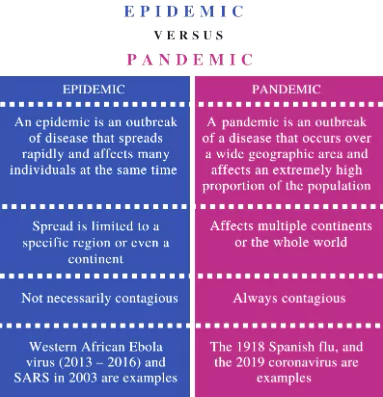Context:
Recently, the Law Commission Published the 286th report on “the management, control, and prevention of epidemic diseases.”
- The Report identified the shortcomings in the existing legal framework, particularly the Epidemic Diseases Act 1897 (EDA) in addressing future epidemics.
What is Epidemic?
- The Centers for Disease Control and Prevention (CDC) describes an epidemic as an unexpected increase in disease cases in a specific geographical area.
- An epidemic disease doesn’t necessarily have to be contagious.
- Examples: Yellow fever, smallpox, measles, and polio.
Epidemic Diseases Act 1897
- Definition: Epidemic Diseases Act 1897 is a colonial-era act empowering the state governments to take extraordinary measures to contain the fast spread of the epidemic. It also defines penalties and provides immunity for Law Commission.
- It is a non-statutory, executive body of the Govt of India.
- Aim: To work for legal reforms.
- Historical Background: The colonial body was established in 1834.
- The Law Commission’s mandate is to Examine the existing laws in India and recommend measures for their improvement.
- Advise the government on the modernization of the law.
- Consider and report on any other matter the Govt may refer to.
- Notable contributions: Hindu Marriage Act (1955), Indian Penal Code (Amendment) Act (2013), Decriminalization of Homosexuality report (2020), Uniform Civil Code report (2021). Actions under different sections of the act.
- Aim: To prevent the spread of “dangerous epidemic diseases”.
- History: First enacted to tackle the Bubonic Plague in Mumbai in former British India.
- Provisions of the 1897 Epidemic Diseases Act: The Act has four sections, aimed at preventing the spread of Dangerous Epidemic Diseases.
- Section 2 empowers state governments/UTs to take special measures and formulate regulations for containing the outbreak.
- Section 3 provides penalties for disobeying any regulation or order made under the Act. These are according to section 188 of the Indian Penal Code.
- Section 4 gives legal protection to the implementing officers acting under the Act.
-
Previous Implementation of Epidemic Diseases Act 1897
- In 2009, it was invoked to combat swine flu in Pune.
- In 2015, it was invoked in Chandigarh to deal with malaria and dengue.
- In 2018, it was invoked in Gujarat to contain the spread of Cholera.
- In 2020, it was invoked across the country to limit the spread of COVID-19.

Limitations of Epidemic Disease Act 1897
- Lack of Clear Demarcation of Powers: The report highlighted no clear distinction between the powers of the center, state, and local authorities during an epidemic and suggested measures to resolve them.
- Limited Scope: The act primarily focuses on containment measures rather than prevention or long-term public health intervention. It does not address crucial aspects like disease surveillance, research, and strengthening healthcare infrastructure.
- Inadequate Compensation: The act does not have clear provisions for providing compensation to individuals or communities affected by measures taken under its ambit.
- Outdated Provisions: The act was drafted in the colonial era and does not fully reflect current medical knowledge, ethical considerations, and human rights norms. Some of its provisions are outdated in the present context.
- Limited Judicial Review: The act provides limited scope for judicial review of actions taken under its authority. This can restrict the ability of individuals to challenge arbitrary or excessive use of power.
- Potential for Abuse: Being a colonial-era legislation, the EDA has great potential for abuse due to its lack of clear guidelines on important subjects.
Law Commission
- It is a non-statutory, executive body of the Govt of India.
- Aim: To work for legal reforms.
- Historical Background: The colonial body was established in 1834.
- The Law Commission’s mandate is to
- Examine the existing laws in India and recommend measures for their improvement.
- Advise the government on the modernization of the law.
- Consider and report on any other matter the Govt may refer to.
- Notable contributions: Hindu Marriage Act (1955), Indian Penal Code (Amendment) Act (2013), Decriminalization of Homosexuality report (2020), Uniform Civil Code report (2021).
|
Way Ahead: Law Commission Recommendations
- Creation of an Epidemic Plan and Standard Operation Procedure: The central govt can create an Epidemic plan in collaboration with state governments after consulting the ministries concerned, private health institutions, and other stakeholders.
- Three Stage Measures: The commission recommended three stages of the spread of infectious diseases as well as the responses at each stage.
- First Stage: The states should be empowered to take “sufficient measures” in line with the epidemic plan, including preventive measures at the micro level.
- Second Stage: It should take place during the Interstate spread of epidemic diseases. The report suggests the Central govt should have the power to frame regulations based on an epidemic plan and states will comply with those framework.
- Third Stage: It is followed by “ Extreme Threat from Infectious Disease”. It mentions that if states are unable to contain the spread of infections and there are conflicting guidelines, the Central Government will step in to impose uniform measures, either by itself or by empowering a central agency.
- Epidemic Plan Preparation: EDA must include provisions to ensure that the Epidemic Plan is prepared, enforced, and revised at regular intervals.
- Essential Components: The report states that the plan should include provisions on quarantine, isolation, and lockdowns, while ensuring that the measures are implemented fairly, without violating the fundamental rights of citizens.
Also Read: Law Commission Report On Criminal Defamation
News Source: The Wire and Indian Express
![]() 13 Feb 2024
13 Feb 2024
